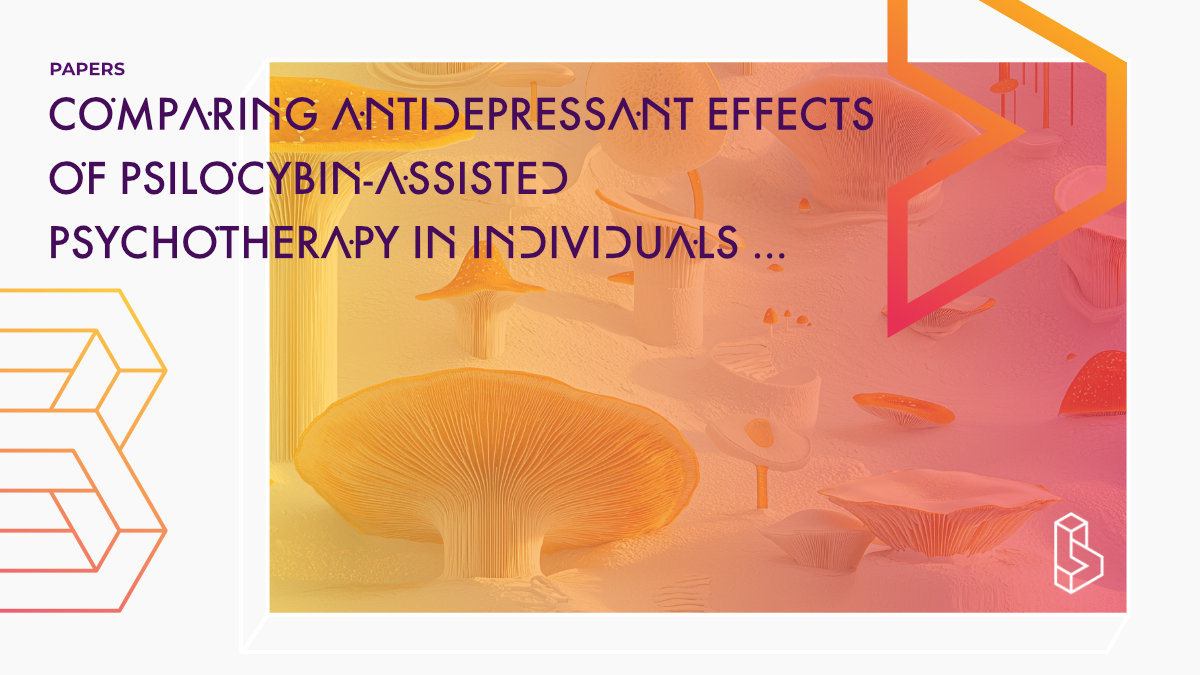This secondary analysis of an open-label waitlist-controlled clinical trial (n=27) finds no significant differences in depression, anxiety, and suicidality symptom improvements between treatment-resistant depression (TRD) patients who discontinued antidepressants before psilocybin-assisted psychotherapy (1-3x25mg; PAP/PAT) and those unmedicated at screening. Both groups experienced clinically significant benefits, with similar psychedelic experience intensity, highlighting the need for further research on medication tapering and PAT efficacy.
Abstract of Comparing Antidepressant Effects of Psilocybin-Assisted Psychotherapy in Individuals That Were Unmedicated at Initial Screening Versus Individuals Discontinuing Medications for Study Participation
“Objective To compare changes in depression, anxiety, and suicidality symptoms after a single 25 mg oral dose of psilocybin between treatment-resistant depression participants not on antidepressants at screening to participants that discontinued antidepressant medications leading up to receiving psilocybin-assisted psychotherapy (PAP).
Methods Participants (n = 27) received at least one 25 mg dose of psilocybin accompanied by psychotherapy as part of an exploratory analysis from an open-label, randomized, waitlist-controlled clinical trial. The primary outcome of changes in depression symptoms was measured by the Montgomery-Åsberg Depression Rating Scale (MADRS). Secondary outcomes included changes in anxiety symptom severity (Generalized Anxiety Disorder 7-Item [GAD-7]), suicidal ideation (MADRS Item-10), self-reported depression symptoms (Quick Inventory for Depression Symptomology [QIDS-SR]), and intensity of psychedelic experience (Mystical Experience Questionnaire 30-item [MEQ30]). Patients were separated into two groups for analysis; those who were unmedicated at initial screening versus participants that had to taper off antidepressant medications to be eligible for the trial. A mixed analysis of variance was used to evaluate clinical outcomes over time from baseline to 2 months post-dose.
Results No significant differences were found between medication discontinued (n = 18) and unmedicated at screening (UAS) (n = 9) groups in clinician rated depression (p = 0.759), self-reported depression (p = 0.215), anxiety (p = 0.178), and suicidality (p = 0.882) symptoms over time, with both groups having clinically significant benefits on all outcomes assessed. Both groups also had a similar intensity of psychedelic experience (p = 0.191).
Conclusion Comparable improvements were observed in depression and anxiety and symptoms between antidepressant discontinued and UAS patients. These findings contrast with and contribute to the growing literature on the effects of medication tapering leading up to PAP. Further clinical research is needed to directly compare efficacy across medication statuses, in addition to evaluating psychedelic effects in individuals continuing antidepressants during PAP.”
Authors: Noah Chisamore, Erica S. Kaczmarek, Zoe Doyle, Danica E. Johnson, Geneva Weiglein, Shakila Meshkat, Ryan M. Brudner, Marc G. Blainey, Jeremy Riva-Cambrin, Roger S. McIntyre & Joshua D. Rosenblat
Summary of Comparing Antidepressant Effects of Psilocybin-Assisted Psychotherapy in Individuals That Were Unmedicated at Initial Screening Versus Individuals Discontinuing Medications for Study Participation
The study examines the impact of psilocybin-assisted psychotherapy (PAP) on individuals with treatment-resistant depression (TRD), with a specific focus on how prior antidepressant use influences treatment outcomes. The researchers aim to determine whether patients who had to discontinue antidepressants before undergoing PAP experience different clinical benefits compared to those who were not on antidepressants at screening. Given the increasing interest in psychedelic-assisted therapies for mental health conditions, this study contributes valuable insights into the potential interactions between prior medication use and psychedelic treatment efficacy.
Treatment-resistant depression is defined as a form of depression that does not respond to at least two different types of conventional antidepressant medications. Many individuals with TRD continue to experience severe symptoms despite available treatment options, necessitating alternative therapeutic approaches. Psilocybin, the psychoactive compound in certain mushrooms, has shown promise in alleviating depression symptoms by promoting neuroplasticity and inducing profound psychological experiences. However, there is ongoing debate about whether antidepressant use before or during PAP affects treatment efficacy, with some researchers suggesting that selective serotonin reuptake inhibitors (SSRIs) might blunt the effects of psilocybin.
Methods
Study Design and Participants
This study was conducted as part of an open-label, randomised, waitlist-controlled clinical trial. The researchers recruited 27 participants diagnosed with TRD, all of whom received at least one 25 mg dose of psilocybin alongside psychotherapy. Participants were divided into two groups: those who had to discontinue antidepressant medication before treatment and those who were unmedicated at the time of screening. This classification allowed the researchers to compare outcomes between these two populations.
Outcome Measures
Find this paper
https://doi.org/10.1177/07067437251328316
Open Access | Google Scholar | Backup | 🕊
Cite this paper (APA)
Chisamore, N., Kaczmarek, E. S., Doyle, Z., Johnson, D. E., Weiglein, G., Meshkat, S., Brudner, R. M., Blainey, M. G., Riva-Cambrin, J., McIntyre, R. S., & Rosenblat, J. D. (2025). Comparing antidepressant effects of psilocybin-assisted psychotherapy in individuals that were unmedicated at initial screening versus individuals discontinuing medications for study participation. The Canadian Journal of Psychiatry.
Study details
Compounds studied
Psilocybin
Topics studied
Depression
Anxiety
Suicidality
Treatment-Resistant Depression
Study characteristics
Original Re-analysis
Open-Label
Randomized
Participants
27
Humans
Linked Research Papers
Notable research papers that build on or are influenced by this paper
Psilocybin-assisted psychotherapy for treatment resistant depression: A randomized clinical trial evaluating repeated doses of psilocybinThis open-label waitlist trial (n=30) assessed the feasibility of psilocybin-assisted psychotherapy (PAP/PAT) in a complex population with treatment-resistant depression (TRD), including major depressive and bipolar II disorders, baseline suicidality, and significant comorbidity. Participants received one, two, or three sessions of PAP with psilocybin (25mg), accompanied by preparation and integration psychotherapy sessions. Immediate treatment showed greater reductions in depression severity (MADRS) compared to the waitlist period, with a large effect size (g = 1.07, p < 0.01). Repeated doses were associated with further reductions in depression severity. Adverse events were transient, and the study demonstrated feasibility, preliminary antidepressant efficacy, safety, and tolerability in this population.
Linked Clinical Trial
Psilocybin for Treatment-Resistant DepressionThis interventional trial (n=40) aims to assess the efficacy of psilocybin (25mg) with psychological support on anhedonia in individuals with treatment-resistant major depressive disorder (MDD).

